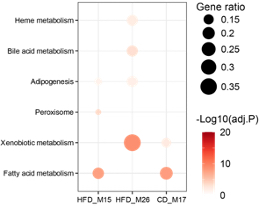Peer review process
Revised: This Reviewed Preprint has been revised by the authors in response to the previous round of peer review; the eLife assessment and the public reviews have been updated where necessary by the editors and peer reviewers.
Read more about eLife’s peer review process.Editors
- Reviewing EditorMarcus SeldinUniversity of California, Irvine, Irvine, United States of America
- Senior EditorDavid JamesThe University of Sydney, Sydney, Australia
Reviewer #1 (Public Review):
Using the colon transcriptomes of 52 BXD mouse strains fed either chow or a high-fat diet (HFD), Li et al. present their findings on gene-by-environment interactions underpinning inflammation and inflammatory bowel disease (IBD). They discovered modules that are enriched for IBD-dysregulated genes using co-expression gene networks. They determined Muc4 and Epha6 to be the leading candidates causing variations in HFD-driven intestinal inflammation by using systems genetics in the mouse and integration with external human datasets. In their analysis, they concluded that their strategy "enabled the prioritization of modulators of IBD susceptibility that were generalizable to the human situation and may have clinical value." This dataset is intriguing and generates hypotheses that will be investigated in the future. However, there were no mechanistic or causation-focused investigations; the results were primarily observational and correlative.
Reviewer #2 (Public Review):
In this paper, the authors seek to identify genes that contribute to gut inflammation by capitalizing on deep phenotyping data in a mouse genetic reference population fed a high-fat or chow diet and then integrating it with human genetic data on gut inflammatory diseases, such as inflammatory bowel disease (IBD) and Ulcerative Colitis (UC). To achieve this the authors performed genome-wide gene expression in the colon of 52 BXD strains of mice fed either a high-fat or chow diet. From this analysis, they observed significant variation in gene expression related to inflammation among the 52 BXD strains and differential gene expression of inflammatory genes fed a high-fat diet. Overlaying this data with existing mouse and human data of inflammatory gut disease identified a significant enrichment. Using the 52 BXD strains the authors were able to identify specific subsets of strains that were susceptible and resistant to gut inflammation and analysis of gene expression within the colon of these strains was enriched with mouse and human IBD. Furthermore, analysis of cytokine levels of IL-10 and IL-15 were analyzed and found to be increased in resistant BXD strains and increased in susceptible BXD strains.
Using the colon genome-wide gene expression data from the 52 BXD strains, the authors performed gene co-expression analysis and were able to find distinct modules (clusters) of genes that correlated with mouse UC and human IBD datasets. Using the two modules, termed HFD_M28 and HFD_M9 that correlated with mouse UC and human IBD, the authors performed biological interrogation along with transcription factor binding motif analysis to identify possible transcriptional regulators of the module. Next, they performed module QTL analysis to identify potential genetic regulators of the two modules and identified a genome-wide significant QTL for the HFD_M28 on mouse chromosome 16. This QTL contained 552 protein-coding genes and through a deduction method, 27 genes were prioritized. These 27 genes were then integrated with human genetic data on IBD and two candidate genes, EPHA6 and MUC4 were prioritized.
Overall, this paper provides a framework and elegant use of data from a mouse genetic reference population coupled with human data to identify two strong candidate genes that contribute to human IBD and UC diseases. In the future, it will be interesting to perform targeted studies with EPHA6 and MUC4 and understand their role in gut inflammatory diseases.




